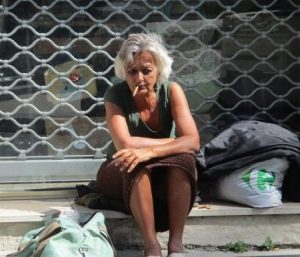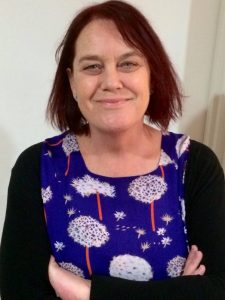
By Natalie Fraser.
The man with the weepy eye is in my spot. I give him the finger and he mumbles something under his breath, unconcerned, not looking at me but at the footpath, as if he didn’t know it was my spot. He is good at this; he plays the weepy eye for all he can get. The eye is cloudy as if he is looking through a gauze curtain. It is red and swollen and it looks sore; the liquid weeping from it is greenish, like pus. People can only stand to look at him for a few seconds, then they give him money to make him go away. He knows this and plays the eye for all it’s worth. Out of all of us, he makes the most money. As I stand there, I see two five-dollar notes go into the Collingwood beanie that he uses to collect his money, then a two-dollar coin. I want to tell him that is my money, rightfully mine, it is my spot. I don’t say anything. can’t be bothered.
I settle for a spot around the corner that does not have as much passing traffic; I’ll be lucky if I get enough for my flagon today. The footpath is cold and my joints ache. I pull the frayed woollen blanket that I carry with me tightly around myself and lie down, blocking the path. This way, people will have to stop to get around my considerable bulk. Got any money? I keep it short and sweet, to the point. My gravelly timbre usually gets their attention; all the booze and cigarettes have given my voice an impressive roughness. I fix my eyes on them and either they give me something or they don’t. There are some that cross the street to avoid me.
The view I get of the world is mostly people’s feet. Women in flashy high heels never give me money. They are usually bad-tempered, in too much pain from their stupid footwear. Men in brogues or leather business shoes also lack generosity. The more expensive the shoe, the less benevolent the person wearing them. People in flat leather hippie shoes or the orthopaedic type are better; they still have some hope and this extends to people like me; they can usually find the good gold change. Doc Martens are pretty good too. Kids in expensive runners are unpredictable; some give me money, while others hurl abuse. Some talk about me as if I do not exist. Look at the disgusting fat old bag, aargh, it makes me sick to look at her.
When I get on the bus that goes along Geelong Road, I can see the fear in people’s eyes. I stroll on, my head held high. I ignore the bus driver in his little Perspex box, I nonchalantly ignore the Myki reader. There is a woman sitting in the priority seats; I plonk down heavily beside her. Her mouth becomes pinched and she breathes in shallow breaths. My rich smell has assaulted her snippy white middle-class nostrils. She stands up awkwardly in her tight black skirt and heels; she moves to the back of the bus and sits next to a bogan with neck tattoos. He looks like an ice addict but even he is preferable to my good self.
Officially, I am not homeless. The boarding house on busy Geelong Road takes most of my pension each week and gives me a tiny, filthy room in return. The carpet stinks and there are fleas from the cat lady in the room next door. But I have thick skin. This place is a tough place, but I am tougher. I use my body for protection, the sheer bulk of me. I have deep-set eyes that peer out from my red face. I can see that people don’t want to mess with me. It isn’t that they think I will hurt them; I think it is more that they see their worst nightmares reflected. Though the other residents at the boarding house have hit rock bottom too, everybody thinks I am the absolute dregs of this place. The fat lady with the blanket who lies on the footpath begging for grog money. But they don’t know who I am.
People can’t see that I was once just like them. Or perhaps they can and that is what frightens them. Once I had a husband and a job and I lived in a little brown box in the suburbs. Gary was good to me at first. He worked hard at his truck-driving job and although he was often away, I was happy. I’ve always been fond of my own company, so really, it was kind of ideal. I had a job at the local Coles, working on the checkout. I would wear a clean uniform each day, my hair neat and freshly styled. Gary would come in to see me at work whenever he returned from an interstate trip. He was always cashed up and he would buy a trolley full of groceries, taking advantage of my employee discount. I would come home to the smell of roast lamb in the oven and a couple of bottles of good red. That was about all we drank back then.
A few months later, when he lost his job, we weren’t too worried. ‘It will be nice to have you home for a while,’ I said. And it was, for a while. I would come home each night to a proper dinner, and he would spend his days digging up the garden and planting vegetables or working on his car. But as the weeks went by and he still hadn’t found a job, he began to drink. Now all he would do all day was sit in the old Jason recliner, watching crap on TV and downing beers. In the morning he would still be snoring loudly in the bedroom while I got ready for work. I always left him twenty dollars so he wouldn’t have to ask me for money. I knew he didn’t have any left though he didn’t want to admit it to me. It wasn’t long before he didn’t care; he was asking me anyway and he always wanted more than the twenty dollars.
It is a bitterly cold day and I have laid my blanket on the concrete to make it warmer. It doesn’t really seem to make any difference. I will my skin not to feel the cold. A kid in Nike runners walks past and kicks me in the stomach. Fuck off, ya smelly old hag, why don’t ya just curl up somewhere and die? Another person in red patent Birkenstocks comes over and asks me if I’m all right. She gives me a ten-dollar note and asks me if I want some food. I ask for a large kebab with garlic sauce and chilli. She gets it for me. I didn’t really feel the kick in the stomach; too much flesh there and now I have ten dollars and a large kebab. Some days are better than others. Should get the kid to kick me more often.
I have been able to separate myself from my skin for a long time. When I was a kid and my mother had discovered one of my messes she would say, wait ‘til your father gets home. And I would wait for the sound of my father as, slamming the gate behind him, he returned from work. He was never in a good mood after work, but he was worse on the days when my mother told on me. Then, my father would make me pull down my undies and bend over a kitchen chair. He would remove his long black belt from his trousers and wrap the part with the holes around his hand. He always used the part with the buckle to hit me because it was supposed to hurt more; it left red welts that I would look at in the mirror afterwards. The first few times I was covered in snot and tears and it seemed the more I cried, the harder he hit me, so I decided not to cry. I would think that my skin was like armour, that it was separate from me and I could put it on and take it off as I pleased. I decided I would feel no pain and after a while I didn’t. This made my father even more furious.
The first time Gary hit me it was because I paid the electricity bill. He asked me for booze money, and I said I didn’t have any left, that I had paid the electricity bill. I didn’t expect the punch to the side of my head. I really didn’t; Gary had never been violent before. I crouched in the corner and covered my head with my arms; he picked up one of his old work boots and just kept hitting and hitting. My arms were black with bruises the next morning and I had two black eyes. I wondered how I would manage to get to work. I wore a long-sleeved top under my uniform and did my best to cover the bruising around my eyes with make-up. At lunch time the manager called me into his office. Is there anything wrong at home? He sat behind his desk and tried to look understanding. He just looked stupid. I told him that everything was all right, that I had run into a door. As if I expected him to believe that, the oldest story in the book. I think you’d better go home, come back when you’re feeling better. After that he stopped giving me regular shifts.
The Vietnamese couple who own the bottle shop are pretty good. They let me come in there and empty my change on the counter. They patiently count out the money for my flagon of McWilliams cream sherry. I take the bottle and find a nice spot near the kebab shop in Nicholson Street mall. The thick, sweet liquid slides down my throat and warms my aching bones. The alcohol takes the edge off life, and I can pretend that I am a queen lying on a silken couch waiting for my servants to bring me treats. I am a famous movie star waiting for my handsome moustachioed lover. I am a rich lady with diamond rings on all my fingers and a diamond tiara in my hair.
By the time I get home at night, I am nicely pickled. I cook up some two-minute noodles for my dinner or heat a stale pie that I get from the people at the Mission for free. I still have some sherry in my flagon and there are two cigarettes left on the bedside table. I turn on the TV that I found down the road; there it was, sitting on the nature strip for the hard rubbish collection. It was a perfectly good TV, so I lugged it home on the bus. I like to watch the cooking shows and the reality shows like The Bachelor. I also like the infotainment shows in the morning, the ones that have all the advertisements in them and then they have normal ads as well. I dream of buying a miracle steam mop or a no-fat frying system.
Gary didn’t have much time for me once I stopped bringing in money. We would be home all day together just bickering and fighting and getting drunk. He would hit me, and I would barely notice it; I had put on my armour again. One morning I woke up and he was gone. With him had gone anything of value that was in the house. After that, I couldn’t pay the rent. The dole wouldn’t keep a flea alive and it wasn’t long before I was being evicted. I moved into my first boarding house in Maidstone. This one was a lot better than the one I am in now. The owner was halfway decent and she used to keep the place nice and clean. On Sundays she would make us a roast dinner with all the trimmings. Of course, like all of them, she would take practically my whole payment each fortnight, didn’t even leave me enough for my cigarettes. And on Friday nights, when she went out, the fat man next door would force his way into my room and rape me. I would put my skin on; it was like armour.
The weather has warmed up a bit and the man with the weepy eye hasn’t been in my spot for a while. I don’t spend too much time worrying what happened to him. He could be in care, he could be in jail, he could be dead. It is none of my business. I lie in a sunny position and prepare myself for a good day. Almost immediately, a woman in open-toed, low espadrilles, saucily displaying a recent pedicure, gives me a five-dollar note. Flowered Doc Martens with lacy black tights gives me a gold coin and a man in black Adidas sneakers gives me another. A kid in fluorescent Nikes stops in front of me, disgusting old bag. He stands there a bit longer and I think he is getting ready to kick me. But he bends down slowly and gives me a Maccas cheeseburger, hope ya choke on it ya fat bitch. He walks away towards the market.

ABOUT THE AUTHOR
Natalie Fraser is a Geelong West based writer of short stories, fiction, non-fiction, and memoir. She has written a food blog, notimeforporridge.com, and performed at many spoken word events and festivals ranging from Melbourne Fringe to the St Kilda Festival. Over the years she has been published in various literary magazines including Going Down Swinging. She has been longlisted and shortlisted for a number of literary prizes around Geelong and Melbourne including the inaugural Djillong Short Story Prize and the Glen Eira ‘My Brother Jack’ award where she was also highly commended. She has won the Ada Cambridge Prize for Biographical Prose at the Williamstown Literary Festival twice – in 2014 and 2021. ‘The Harder They Fall’ was her 2021 prize-winning entry. She is currently working on an anthology of short stories and a memoir. Natalie joined Geelong Writers in 2021 and has found it to be a valuable resource and a great way to meet other local writers.

Leave a Reply